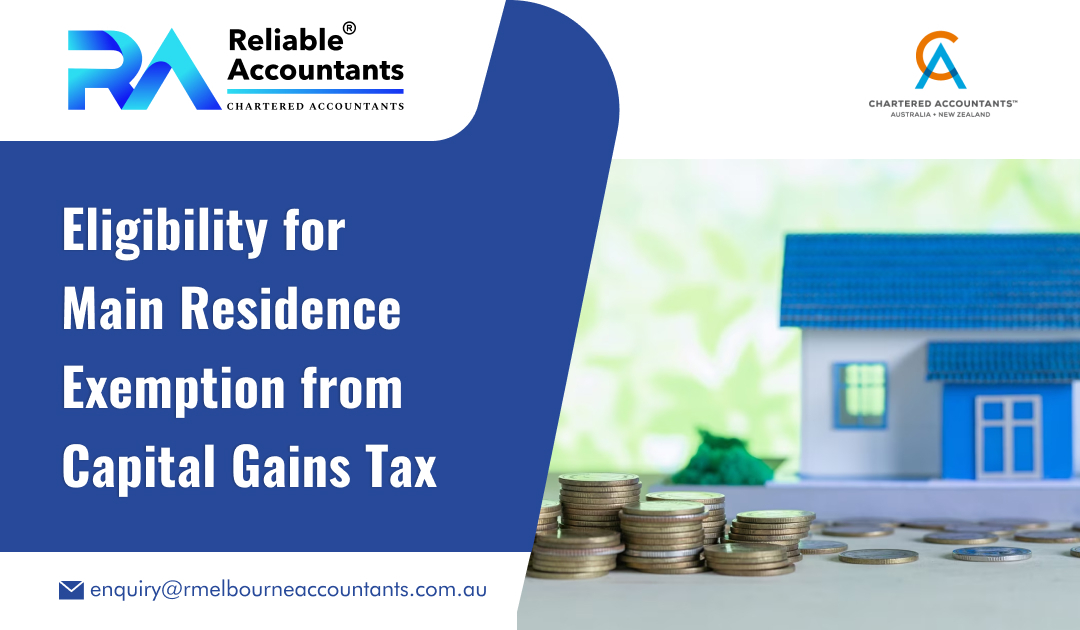Have you owned a property in Australia, and are you wondering about your eligibility for this exemption? If yes, you must read this blog. Continue reading this blog to know the conditions and eligibility requirements to check if you qualify for the main residence exemption and whether your property is considered to qualify to exempt the main residence from capital gains tax.
What is Capital Gains Tax?
The tax you pay on profits from selling investments like stocks, real estate, or digital assets is known as capital gains tax (CGT). Apart from being known as “capital gains tax,” it is actually an element of your income tax. It is not a different tax. A CGT event may be triggered if you dispose of assets (often when you stop being the owner of an item). You must include both capital gains and losses in your income tax return at this time.
What are the Eligibility Requirements for Main Residence Exemption from CGT?
Your main residence can be exempt from capital gains tax if you are an Australian resident and the dwelling:
- has been the home of you, your spouse, and other dependents for the entire period you’ve owned it
- has not been utilised to generate income – that is, you’ve not operated a business from it, rented it or flipped it
- is on land of two hectares or less.
If you meet all these conditions, congratulations, you won’t have to pay any tax on the capital gain when you sell your home and any capital loss can be ignored if you don’t meet all the conditions for a full exemption, don’t worry, you may still be liable to a partial exemption. The CGT property exemption tool can help you calculate the proportion of exemption you qualify for. Be sure to use this tool to determine the extent of the exemption you may be eligible for. When completing your tax return, utilise the result if you used this tool to estimate your capital gain or loss before selling your stake in a property. You should do so with your updated facts.
What is a Main Residence?
Basically, a dwelling can be considered your main residence if:
- you and your family members live in it
- your belongings are in it
- it is the house address where all your mail is delivered to
- this address is on the electoral roll
- services, including power and gas, are connected.
Now, let’s understand what constitutes a main residence or dwelling, the length of time you stay in the dwelling and whether you are likely to occupy it as your home may also be considered a dwelling is defined as anything used wholly or mainly for residential accommodation.
What is a Dwelling?
A dwelling is anything that can be used fully or primarily for residential accommodation, such as:
- a cottage or house
- flat or an apartment
- a strata title unit
- a unit situated in a retirement village
- a houseboat, caravan or other types of mobile home.
Flats or home units often include separate areas like a laundry or garage. They are exempt from capital gains tax on the same basis as the unit or flat. However, if any one of these structures is disposed of separately from the flat or home unit, they will not be exempt from CGT unless they were acquired compulsorily
Foreign Residents
If you were not an Australian citizen for tax purposes, you intend to meet the requirements for the main residence exemption. If you are a foreign resident, when a CGT event occurs, such as selling the property, you may not be eligible for the main residence exemption.
Conclusion
Understanding, the main residence exemption is crucial for managing your financial matters. It might be difficult for many of you to manage all these types of financial matters without seeking help from a professional accountant. Therefore, for personalised guidance and assistance with your tax needs, consider consulting our experts at Reliable Melbourne Accountants.

